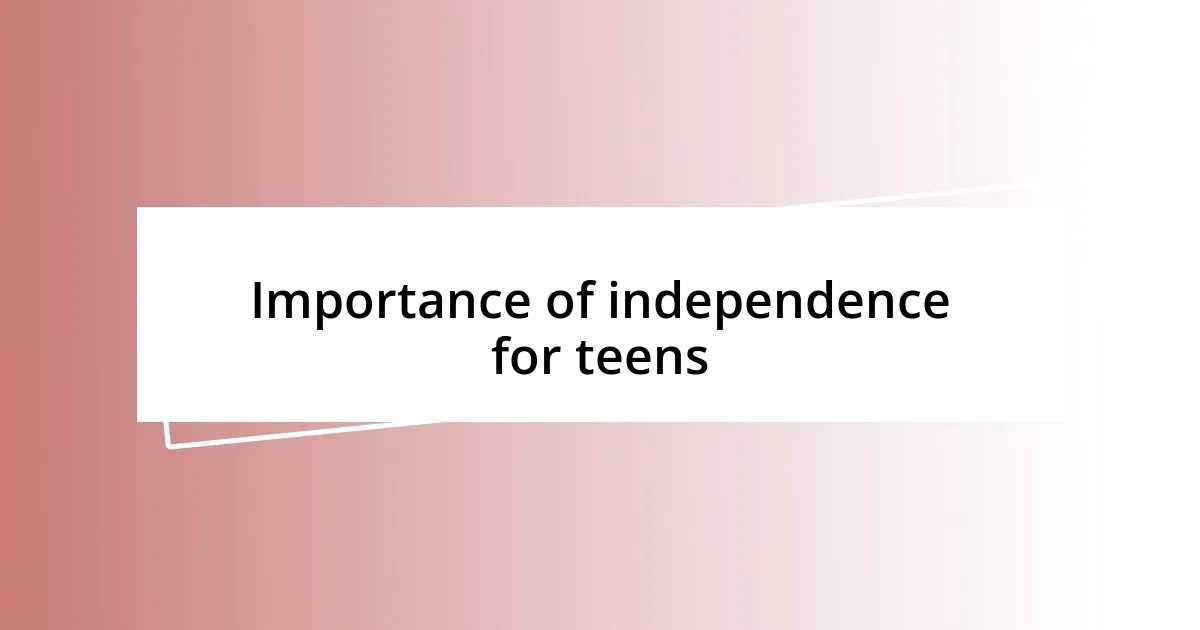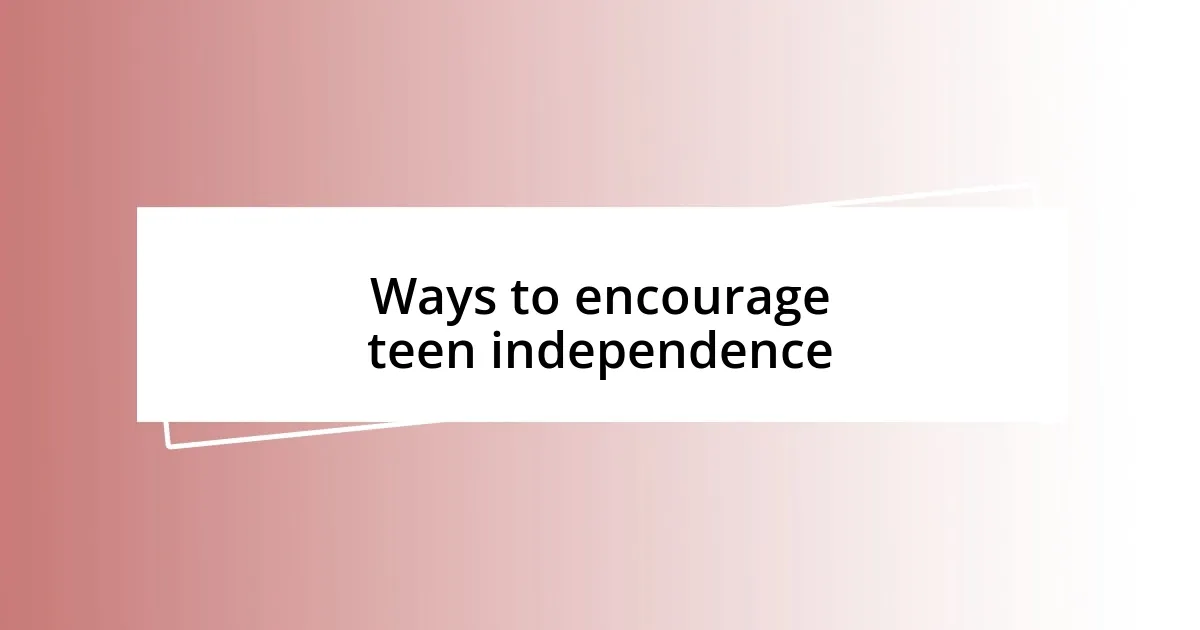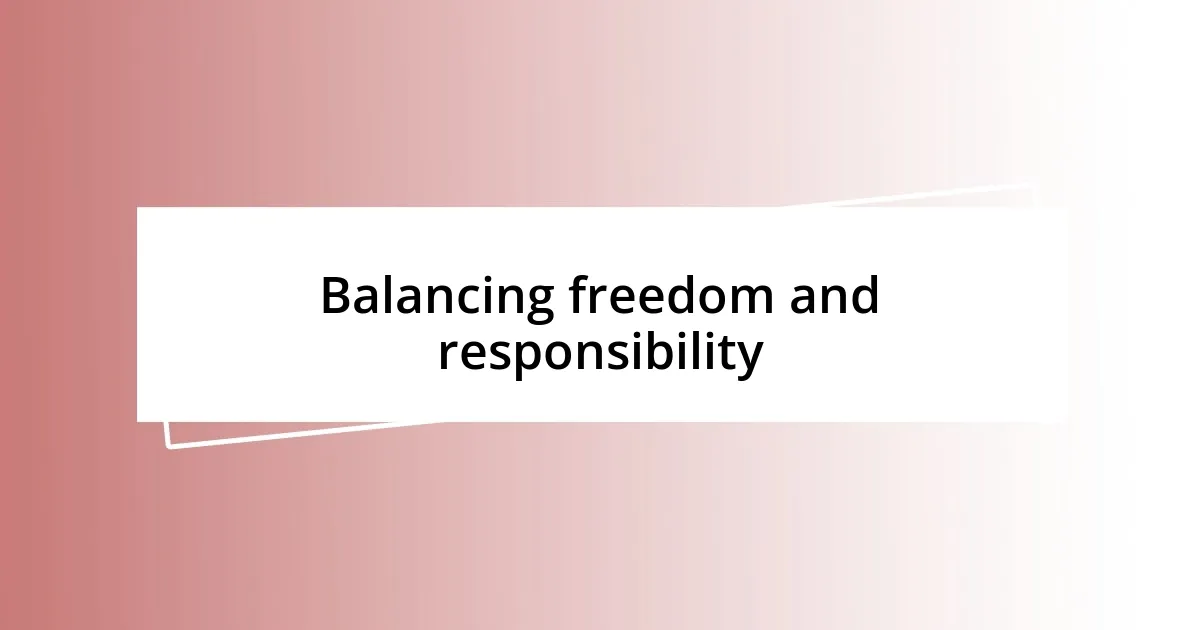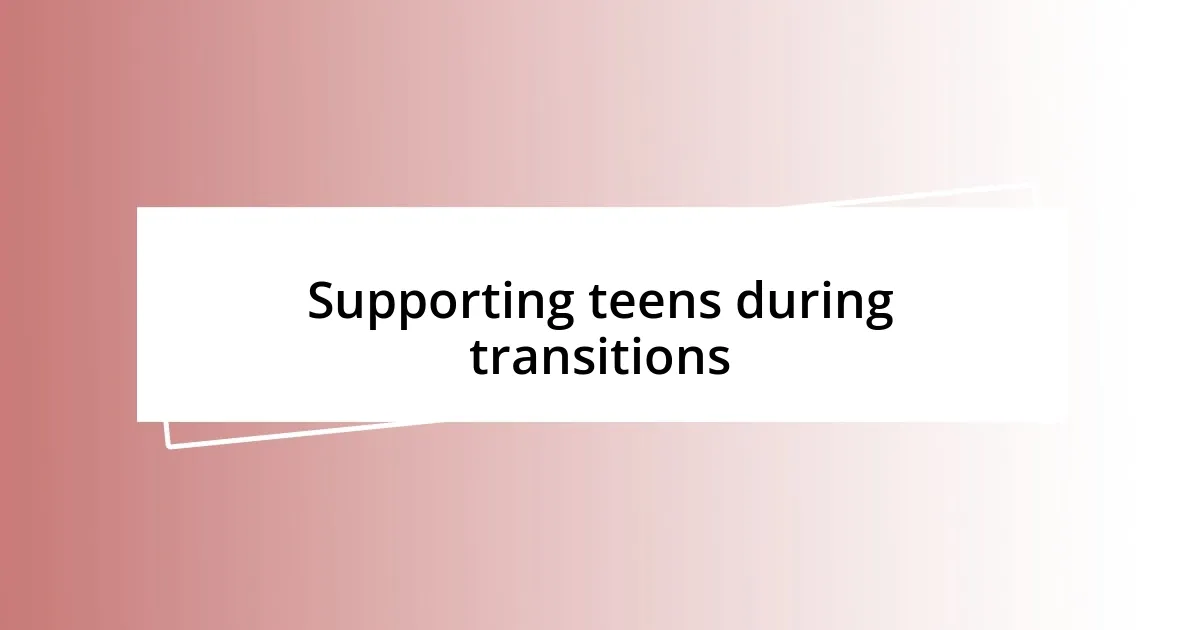Key takeaways:
- Teen independence is essential for self-discovery, decision-making, and personal growth, shaping their identities and confidence.
- Encouraging independence involves providing opportunities for responsibility, such as managing schedules and finances, and including teens in family decisions.
- Setting boundaries is crucial; they provide safety and teach accountability while allowing for exploration of independence.
- Open dialogue between parents and teens fosters a supportive environment where freedom and responsibility can coexist effectively.

Understanding teenage independence
Understanding teenage independence isn’t just about gaining the freedom to make choices; it’s a crucial developmental stage where teens begin to carve out their identities. I remember when I first took the bus alone to school. At that moment, I felt an exhilarating mix of anxiety and excitement—could I navigate this new environment successfully?
As teens gain independence, they develop critical life skills that will shape their futures. Think back to your own teenage years: didn’t those small victories, like managing your own homework schedule or planning a day out with friends, contribute to your confidence? It’s heartening to see young people tackle these challenges, transforming uncertainties into self-assurance.
This journey isn’t always smooth. Many teens experience a tug-of-war between seeking freedom and the comfort of parental guidance. I vividly recall a friend wrestling with the decision of whether to apply for a summer job; she craved the experience but feared disappointing her parents. This independence isn’t just a desire—it’s a need for self-discovery and personal growth.

Importance of independence for teens
Independence plays a pivotal role in teenage development. From my perspective, it’s during these formative years that young people start testing their boundaries. I remember the first time I was allowed to choose my extracurricular activities. It felt empowering to weigh my options and decide based on my interests. This freedom fosters a sense of responsibility that can be incredibly rewarding.
Here are some key reasons why independence is vital for teens:
– Self-Discovery: Teens learn about their likes, dislikes, and passions.
– Decision-Making Skills: Making choices helps develop critical thinking and problem-solving abilities.
– Confidence Building: Successfully navigating challenges boosts self-esteem.
– Preparation for Adulthood: Learning independence serves as vital preparation for future life responsibilities.
– Social Skills Development: Interacting without parental oversight encourages healthy peer relationships.
As I reflect on these aspects, it becomes clear how instrumental they are in shaping a well-rounded adult. Each decision, whether big or small, contributes to constructing a teenager’s identity and confidence.

Ways to encourage teen independence
Encouraging teen independence is all about providing opportunities and support. For instance, allowing a teen to manage their own schedule for schoolwork not only instills a sense of responsibility but also teaches time management. I clearly remember my parents letting me plan my week for the first time. It was empowering to balance homework, chores, and leisure. That experience was a game-changer for me!
Another effective method is to involve teens in family decision-making. Whether it’s planning a vacation or deciding on family activities, I found that when my opinions mattered, I felt valued. This practice can spark meaningful conversations and highlight the importance of negotiation and compromise, which are crucial skills for adulthood.
Encouraging financial independence is also significant. When my parents gave me a small allowance to manage, I learned to budget my money for outings with friends or small treats. I quickly grasped the importance of saving and prioritizing spending. Allowing teens to make choices with money helps build their confidence in managing finances, a skill they will rely on for the future.
| Method | Description |
|---|---|
| Managing Schedules | Teens learn responsibility and time management by planning their own tasks. |
| Involvement in Decision-Making | Giving teens a voice in family choices fosters a sense of value and negotiation skills. |
| Financial Independence | Managing a budget teaches financial responsibility and prioritization. |

Setting boundaries for independence
Setting boundaries is crucial when it comes to fostering independence in teenagers. I remember when my parents set certain rules around my curfew. At first, I felt frustrated, but over time, it helped me understand the importance of responsibility and trust. These boundaries can actually provide a sense of safety, allowing teens to explore their newfound independence within a secure framework.
Establishing clear and consistent rules empowers teens to make choices while still respecting family values. For example, I once had a friend whose parents let him choose his friends but required him to check in with them regularly. This taught him the value of accountability and strengthened his friendship skills. Boundaries don’t have to feel restrictive; rather, they can serve as guiding principles that encourage personal growth.
It’s essential to regularly revisit and adjust these boundaries as teens evolve. I often ask myself, “What are the areas where my teen is ready to take on more responsibility?” This reflection allows me to engage in open discussions with the young person about what they feel comfortable with while still finding a balance to protect their well-being. It’s a dance of trust and communication that fosters both independence and connection.

Balancing freedom and responsibility
Finding the right balance between freedom and responsibility can feel like walking a tightrope. I often recall the thrill of getting my first job; it came with a newfound freedom to spend my own money. Yet, that excitement was quickly paired with the responsibility of showing up on time and managing my earnings wisely—lessons I still carry with me today. This journey of balancing those two aspects shaped my understanding of accountability.
In my experience, it’s vital for teens to experience manageable levels of freedom that correspond to their growing responsibilities. When I turned 16, my parents allowed me to choose my weekend plans, but I had to keep my grades up. This taught me that freedom is rewarding, but it comes with expectations. Have you ever noticed how the more freedom you give a young person, the more they seem to rise to the occasion? It’s fascinating how those pressures can drive positive outcomes.
Ultimately, the key is open dialogue between teens and their parents about expectations. There were moments when I felt overwhelmed by the choices I had to make, and sharing this with my parents opened up discussions that were crucial for my growth. How many times have we learned from simply talking things out? That communication creates a space where both freedom and responsibility can coexist, allowing teens to flourish while still feeling supported.

Signs of healthy independence
Healthy independence in teenagers often manifests in their ability to make informed decisions and solve problems on their own. I remember a time when my younger sibling had to decide between two sports teams. Instead of immediately turning to our parents for advice, she researched each option and weighed the pros and cons. This experience showed me that with a little encouragement, teens can develop critical thinking skills and feel empowered to tackle choices confidently.
Another sign of healthy independence is when a teen starts to express their own opinions, especially during family discussions. I can still picture my cousin during a dinner conversation, passionately sharing her views on a book we read together. It was refreshing to listen to her articulate thoughts and stand her ground while respecting others’ viewpoints. When a young person engages in open dialogue like this, it not only demonstrates their individuality but also fosters respect and maturity within the family dynamic.
Lastly, managing their own daily responsibilities effectively is a strong indicator of a teen’s growing independence. I recall feeling proud when I tackled my homework, chores, and social life without my parents constantly reminding me. It felt liberating to organize my schedule, even if it meant sacrificing some fun time. I often wonder how many teens realize that learning to manage these small tasks lays the foundation for their adult lives. Being able to balance responsibilities and personal interests fosters a sense of competence and confidence that is invaluable during this transitional phase.

Supporting teens during transitions
Supporting teens during transitions can truly make a difference in their development. I vividly remember when my best friend went through the transition of moving to a new school. Initially, she felt lost and anxious, but with support from her parents and some understanding teachers, she gradually found her footing. How powerful is it to know that a little encouragement can transform fear into confidence?
In my view, it’s essential to create an environment that encourages exploration while remaining a safety net during challenging times. When I was navigating my first significant breakup, my parents didn’t flood me with advice; instead, they simply listened. That experience taught me the value of having someone to lean on while figuring things out on my own. Have you ever noticed how those moments of support help build resilience in a teen?
Finally, celebrating small milestones during these transitions can significantly boost a teenager’s self-esteem. I can recall the relief I felt when I successfully made new friends at that same school. It was the little victories—like an awkward yet hearty laugh shared with classmates—that built my comfort. Recognition of these moments can reinforce the idea that transitions are not just hurdles but opportunities for growth. How do we ensure that these achievements don’t go unnoticed? In my experience, acknowledging them fosters a spirit of perseverance and encourages teens to embrace new challenges with optimism.














